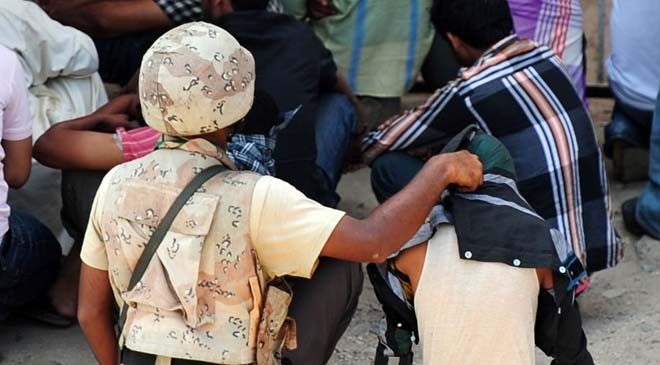

Saad Qureshi is at a loss. For the past ten days, since the mutilated body of his younger brother, Salman Qureshi, was found at a roadside in the outskirts of Karachi, he is trying to figure out why they killed him.
He can’t think of any reason. He believes the only plausible motive which may have driven the killers to shoot his brother from close range after weeks of torture was his ethnic identity: he was a Mohajir.
"A 22 years old Urdu-speaking man with a fine prospect," is how Saad describes his brother. "He was a political activist, a member of the Muttahida Qaumi Movement (MQM), which is not a crime. If it is a crime then a majority of young men in the city should be summarily executed."
Salman Qureshi was a final year student of political science at the University of Karachi. Salman, along with five others, were picked up by ‘men in plain clothes’ (an oft-used euphemism for law enforcement agencies) from Gulzar-e-Hijri, a middle-class neighbourhood in Gulshan-e-Iqbal Town on April 13, 2014.
After 18 days, the bodies of four of the abducted men were found from Memon Goth, a neighbourhood to the north-west of Karachi. Two of them are still missing and presumed dead.
Saad has no doubts in his mind that it was the work of law enforcement agencies.
Extra-judicial abduction and killing
Political parties and human rights groups say that since the targeted operation started in Karachi in September last year, the law enforcement agencies have extra-judicially killed or abducted dozens of men. Out of those abducted, some were later found dead, but most of them are still missing.
The cases have a linear plot. The stories follow an almost identical pattern -- men in ‘plain clothes’ show up, kidnap a son, husband or a brother and vanish into thin air. The endings, however, vary. Some are found dead -- their mutilated bodies are recovered from roadsides across the city, and the families learn to accept the fact and move on. But, for others, the agony continues. Their fate hangs in balance.
Whenever a trussed up body is found the families of those missing hold their breath. A father or a brother goes to the morgue for identification, hoping against hope that it is not of their loved one.
Targeting human rights
The Muttahida Qaumi Movement, the largest political party in the city, claims that since September 2013, 41 of their workers have been abducted by the law enforcers and the number of those killed during the period stands at 85.
"The so-called targeted operation in Karachi was actually a planned conspiracy to wipe out the MQM," says Amin ul Haque, a member of central coordination committee of the party. "If any of our workers were involved in criminal activities, the law enforcement agencies should bring them to court. You cannot decide who is a criminal and who is not."
The Human Rights Commission of Pakistan (HRCP) also noted that in the ongoing targeted operation, scores of political activists were illegally abducted and killed. "This is a cause of serious concern," says Zohra Yusuf, the chairperson of HRCP. "The MQM had been voicing its reservation against the operation as their workers are being abducted, tortured and killed which should be investigated."
Yusuf further says that despite the ‘clean up’ approach of the law enforcement agencies to restore order in the city, not much has been achieved. "There was a marked dip in incidents of targeted killings in the first few months of the operation, but after that, the sectarian and political killings returned to routine. We do not think the approach is working."
A reason to MQM’s ‘return’ to Sindh government
The MQM leadership’s decision to join the Sindh government on April 22, 2013 was, among other factors, the result of pressure from workers to stop the ongoing abductions and killings, observers say.
It began to yield results. A day after, the four bodies of the MQM workers were found, the Sindh assembly unanimously passed a resolution condemning the killings. And the provincial government had also ordered a judicial inquiry into the deaths -- a move unprecedented since the operation began.
"We believe the Sindh government has done its bit by ordering a judicial inquiry," said Wasey Jalil, a senior leader of the MQM. "It is the police and Rangers, or officers in their ranks who are bent on killing and abducting our workers."
Law enforcement agencies deny involvement
Although the MQM and the rights group point a finger at the law enforcement agencies, they categorically deny taking any extra-judicial step during the operation.
"The police has a clear mandate and that is to follow the law," says Shahid Hayat, the Additional Inspector General of Police (AIG), "If we arrest someone we present them to the courts, that is how we proceed, we cannot do otherwise," he says, adding that if any of the officers of Karachi police is found involved in unlawful activities they are dealt with according to the law.
The Rangers officials, however, were not available for comment.
But Saad is convinced that it was the officers of law enforcement agencies who killed his brother. "My brother Salman was a regular student at the university. He had a fixed routine. He would come home in the evening, ask for Rs.100 from my father for bike’s petrol and go to the snooker club or for a night match." Saad argues that had Salman been a lethal criminal, he would not have asked for pocket money. Or they would not have lived in a rented house. "My brother was innocent."